How Long Does It Take to Rank a Website on Google?
|
Getting your Trinity Audio player ready...
|
Ranking a website on Google is a gradual process that depends on several factors, including website authority, content quality, competition, and SEO strategies.
While some websites may see improvements in rankings within 3 to 6 months, others – especially in highly competitive industries – might take 12 months or more to secure a strong position on the first page of Google.
In this guide, we’ll break down the timeline for ranking a website on Google, the factors affecting rankings, and strategies to speed up the process.
Table of Contents
ToggleUnderstanding Google’s Ranking Timeline
There is no fixed time for a website to rank on Google, as it depends on numerous factors. However, SEO experts generally observe the following trends:
| Website Type | Estimated Ranking Time |
|---|---|
| New Website with No Authority | 6–12 months |
| Medium Authority Website | 3–6 months |
| High Authority Website | 1–3 months |
| Competitive Industry (Finance, Health, Tech) | 6–18 months |
| Low-Competition Niche | 1–4 months |
For highly competitive keywords, ranking on the first page can take even longer. But by using the right SEO strategies, you can accelerate the process.
Factors That Affect Website Ranking Time
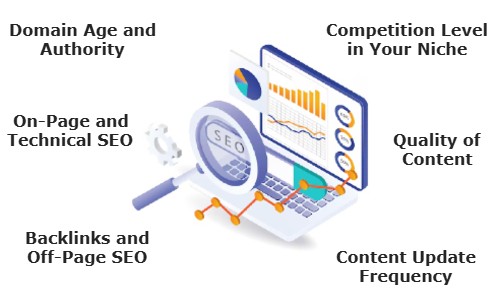
Several factors influence how long it takes to rank on Google. Understanding these factors will help you optimize your website effectively.
Domain Age and Authority
- New domains take longer to rank since Google prioritizes trusted and authoritative websites.
- Websites that have been around for years and have a strong backlink profile tend to rank faster.
- If your domain is brand new, expect a longer ranking period unless you implement strong SEO practices.
Competition Level in Your Niche
- If you’re targeting highly competitive keywords (e.g., “best credit cards”), you will face fierce competition from well-established websites.
- If you focus on low-competition long-tail keywords, you can rank faster.
For example:
- Competitive keyword: “Best smartphones” (takes longer to rank)
- Low-competition keyword: “Best smartphones under 15k for gaming in India” (ranks faster)
Quality of Content
Google prioritizes high-quality, relevant, and user-friendly content. To rank faster, your content should be:
- Informative and answer users’ queries effectively.
- SEO-optimized with proper headings, keywords, and structure.
- Original and unique, avoiding duplicate content.
On-Page and Technical SEO
A website that follows on-page and technical SEO best practices ranks faster. Key factors include:
- Keyword optimization in titles, headings, and content.
- Optimized meta descriptions and image alt text.
- Internal linking to enhance user experience.
- Mobile-friendliness and fast loading speed.
Google’s Core Web Vitals update emphasizes user experience, so having a well-optimized website is crucial.
Don’t Miss: On-Page SEO vs. Off-Page SEO: What’s the Difference?
Backlinks and Off-Page SEO
- High-quality backlinks from reputable websites improve authority and speed up rankings.
- Avoid spammy or low-quality backlinks, as they can lead to penalties.
- Guest posting, PR mentions, and link-building strategies can help your site rank faster.
Content Update Frequency
Websites that consistently publish fresh, valuable content tend to rank faster. Google favors:
- Regular blog updates
- Evergreen content (topics that remain relevant over time)
- User engagement metrics (time on page, bounce rate)
If your website remains inactive for months, ranking can take longer.
How to Rank Faster on Google? (Proven Strategies)
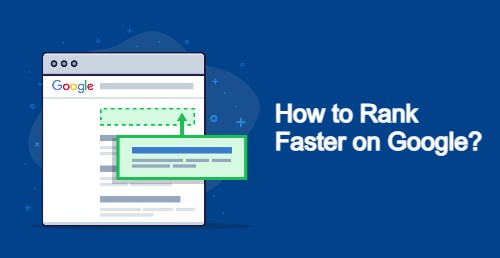
If you want to speed up the ranking process, follow these strategies:
Focus on Low-Competition, Long-Tail Keywords
Instead of competing for broad terms, target long-tail keywords with lower search volume but higher conversion rates.
- Example: Instead of “SEO tips,” focus on “Effective SEO strategies for small businesses in 2025.”
- Use tools like Google Keyword Planner, Ahrefs, or Ubersuggest to find easy-to-rank keywords.
Improve Your Website’s Technical SEO
A well-optimized website ranks faster. Focus on:
- Enhance page speed using tools like Google PageSpeed Insights.
- Fixing broken links and optimizing your URL structure.
- Implementing Schema Markup for rich results.
- Ensuring mobile responsiveness.
Create High-Quality, In-Depth Content
- Write long-form, in-depth blog posts (1,500+ words).
- Add relevant images, videos, and infographics to increase engagement.
- Optimize headings (H1, H2, H3) and include keywords naturally.
Build High-Quality Backlinks
Backlinks are still one of the strongest ranking factors in Google’s algorithm. To earn backlinks:
- Guest post on industry-related websites.
- Publish research-backed content that others want to reference.
- Engage in HARO (Help a Reporter Out) to get mentioned in news articles.
Leverage Social Media and Content Promotion
While social media signals don’t directly affect rankings, they help increase website traffic.
- Share blog posts on Facebook, Twitter, LinkedIn, and Pinterest.
- Engage with relevant communities on Reddit, Quora, and niche forums.
Regularly Update and Repurpose Old Content
Google rewards fresh content. If you have existing blog posts, refresh them with:
- New statistics and trends
- Improved readability
- New multimedia elements (images, videos)
This keeps your website relevant and boosts rankings.
5 Typical SEO Mistakes That Delay Rankings
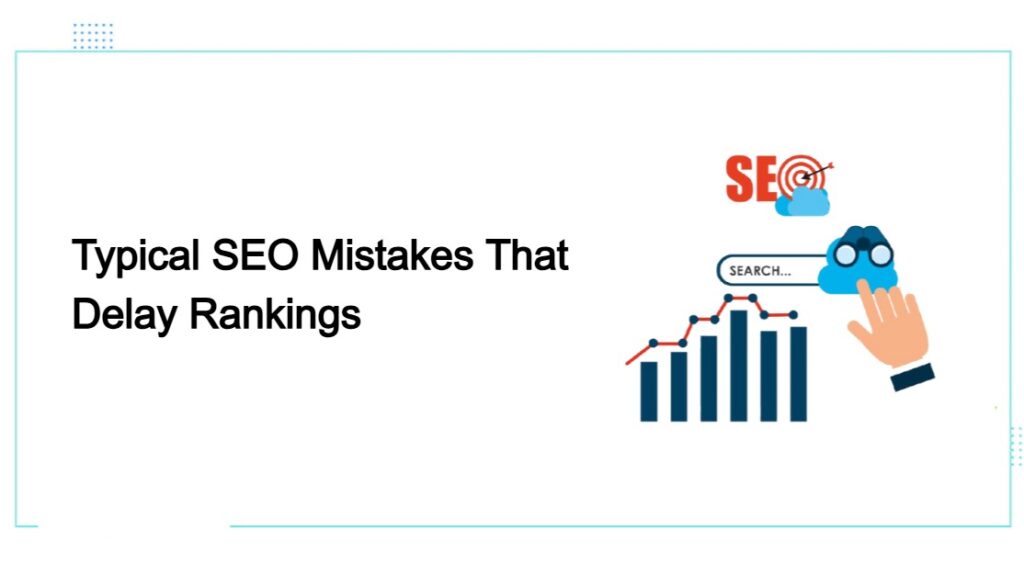
SEO is a long-term process, and making mistakes can delay or even prevent your website from ranking well on Google.
Below are some of the most common SEO mistakes that slow down rankings and how to avoid them.
1. Targeting Highly Competitive Keywords from the Start
Many beginners make the mistake of going after high-volume, competitive keywords that are dominated by big brands.
Without a strong domain authority and backlinks, ranking for these keywords is extremely difficult. Instead, focus on long-tail keywords with lower competition but higher conversion potential.
2. Publishing Thin, Low-Quality Content
Google favors content that is informative, engaging, and provides real value to users. Thin content—short, poorly written, or duplicate content – does not rank well. Aim for in-depth, well-researched blog posts that provide real value.
Adding images, videos, and structured formatting (headings, bullet points) improves readability and ranking potential.
3. Ignoring Website Speed and Mobile-Friendliness
Slow websites lead to high bounce rates, negatively impacting SEO. Google’s Core Web Vitals update emphasizes page speed, mobile-friendliness, and user experience.
Use tools like Google PageSpeed Insights to improve load times and ensure your site is mobile-optimized.
4. Buying Spammy Backlinks
Backlinks are crucial for SEO, but low-quality, spammy links from irrelevant sites can get your website penalized.
Instead, focus on earning high-authority backlinks through guest posting, industry collaborations, and PR outreach.
5. Not Updating Content Regularly
Google favors fresh, updated content. If your website remains stagnant, rankings can drop. Regularly update old blog posts, add new information and statistics, and repurpose content to maintain relevance.
By avoiding these mistakes and focusing on quality, user experience, and ethical SEO practices, your website will rank faster and maintain long-term success on Google.
How to Track Your Website’s Ranking Progress
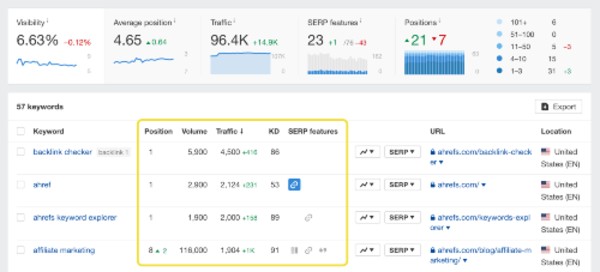
Tracking your website’s ranking progress is essential for refining your SEO strategy and improving visibility on Google. Here are some key tools to monitor your rankings effectively:
1. Google Search Console
Google Search Console helps you track how your site appears in search results. It allows you to:
- Check indexed pages to ensure Google is crawling your site properly
- Monitor performance metrics like impressions, clicks, and CTR
- Analyze search queries that bring traffic to your site
2. Google Analytics
Google Analytics offers valuable insights into your website’s traffic patterns and user interactions. With it, you can:
- Track organic traffic growth over time
- Analyze bounce rates and session duration
- Understand which pages perform best
3. Ahrefs / SEMrush / Ubersuggest
These premium SEO tools offer detailed ranking and competitor analysis. They help you:
- Track keyword rankings and fluctuations
- Analyze backlink profiles and identify link-building opportunities
- Study competitor strategies to refine your own SEO approach
Since ranking takes time, regularly monitoring your website’s performance with these tools will help you make necessary improvements and achieve better SEO results faster.
Hire a Professional Agency Like Fifth Shield
SEO is a long-term investment that requires expertise, consistency, and strategic planning. Hiring a professional SEO agency like Fifth Shield can help you achieve faster and more sustainable rankings.
With in-depth keyword research, technical SEO optimization, high-quality content creation, and ethical link-building strategies, Fifth Shield ensures your website meets Google’s ranking criteria.
Instead of struggling with SEO on your own, partnering with experts can save time, improve results, and maximize your website’s growth potential. Get FREE 30-min SEO Consultation.
Wrapping Up
Ranking a website on Google is a time-consuming process influenced by factors such as domain authority, competition, content quality, and SEO strategies.
While some sites may see improvements in a few months, others in competitive niches may take over a year. By implementing strong SEO practices, focusing on high-quality content, optimizing technical aspects, and building credible backlinks, you can accelerate rankings.
Regularly tracking progress using tools like Google Search Console and Ahrefs helps refine strategies and achieve long-term success.
Don’t Miss: 9 Common Mistakes to Avoid in Google Business Profile Optimization

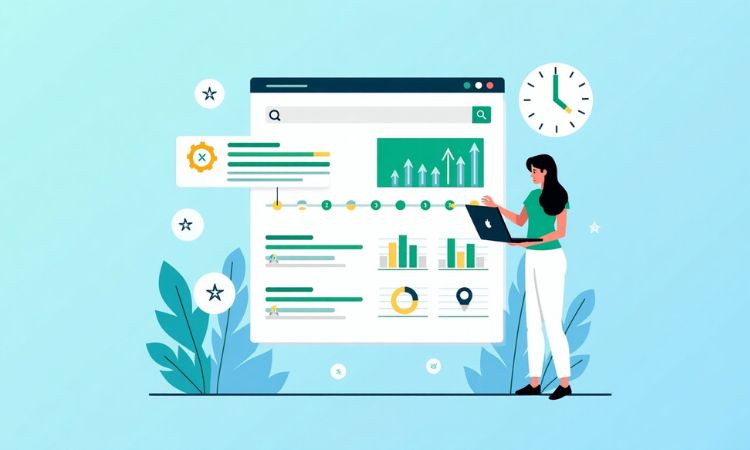





Write a Comment